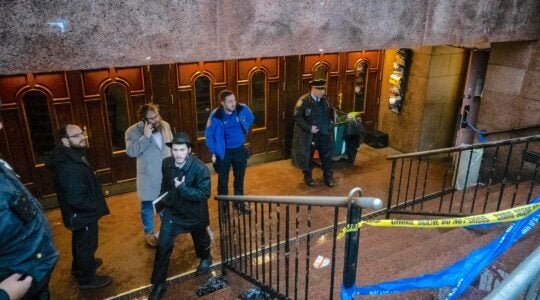Wavering between pragmatism and principle, mainstream pro-Israel organizations have opted not to make a major issue — at least for now — over the Clinton administration decision to delay moving the U.S. embassy in Israel to Jerusalem.
With Benjamin Netanyahu on his way out and Ehud Barak not yet in office, the American Jewish groups would prefer to get a reading on how the new prime minister feels about the American decision before taking action. The American Israel Public Affairs Committee (AIPAC), which was criticized by a Barak spokesman as partisan toward Netanyahu, is particularly concerned about objecting strenuously to the U.S. move on the eve of a Barak-Clinton meeting in Washington.
“Barak will be coming in several weeks, and there is concern that his first meetings
The JewishWeek.com on Facebook
with the administration will be shadowed by a new confrontation over Jerusalem,” said a leading pro-Israel activist. “And there are worries that Jewish groups will be seen as responsible if he starts his dealings with Washington on a confrontational note.”
So while the American Jewish community remains united in its support of Jerusalem as Israel’s eternal capital, it is reluctant to force the issue now. The administration is also wary, for its own reasons.
Last Friday, four years after Congress overwhelmingly passed a law requiring that the American embassy be moved from Tel Aviv to Jerusalem, President Clinton invoked his authority to waive the law, citing “national security” interests.
Washington is fearful of offending the Palestinians at this delicate juncture in peace negotiations, since the Arabs insist on establishing east Jerusalem as the capital of their future state.
On Capitol Hill, the initial fervor for tough new legislation is giving way to a more measured response to Clinton’s failure to move the facility by May 31, as the law requires.
This week Sen. Jon Kyl (R-Ariz.), who warned of strong legislation in response to a waiver, circulated a letter urging the president to at least acknowledge the intent of the original legislation.
That last-ditch effort to find a compromise formula is being backed by AIPAC, which spurred passage of the original 1995 law. This week AIPAC officials expressed disappointment at the waiver, but behind the scenes, the group is trying to avert a bloody showdown.
Jerusalem is the ultimate symbol in a region where symbols can mean the difference between war and peace. In fact, every U.S. policy option is filled with risk and uncertainty.
“The debate comes down to two basic alternatives: proceed with the move or wait,” said David Harris, executive director of the American Jewish Committee. “But each has implications that are hard to project into the future; each could touch off the law of unintended consequences.”
Pro-Oslo forces say any effort to change policy on Jerusalem would be seen as a U.S. tilt on an issue all sides agreed would be resolved as part of the final-status talks.
The U.S., in its role as Mideast mediator, wants to maintain “the maximum of maneuverability during this period,” said Robert O. Freedman, president of Baltimore Hebrew University and a leading peace process supporter, “This is Diplomacy 101.”
Freedman expressed skepticism about move-it-now advocates who claim they are simply trying to correct a longstanding diplomatic injustice.
“This is being done to embarrass the president and to embarrass Barak,” he said. “Let Barak form his government, and let him develop his policy for finishing Wye and starting the final-status talks. Then we can talk about the embassy.”
Jewish groups are jumping on the Jerusalem bandwagon, he said, because “everybody is afraid of being seen as unholy on Jerusalem. It’s not helpful.”
Some Jewish organizations have resisted. Last week the Reform movement weighed in with a statement saying the decision not to move the embassy now is “understandable.”
But opponents of the waiver say there will never be an easy time to make the embassy move, and they point to recent Palestinian actions — including their resurrection of the original UN partition plan — as evidence that Arafat is trying to end-run the final-status talks about Jerusalem’s future.
Douglas Feith, a key figure behind the current embassy push, rejected charges that supporters are using the embassy issue simply to erect another obstacle along the potholed Oslo highway. He said that his efforts are based both on Mideast and constitutional considerations.
“This debate taps into the root issue of the conflict — Israel’s right to exist,” said Feith, a Reagan administration national security official. “The people who are attacking Israel’s rights in Jerusalem are doing so as a means of attacking Israel’s right to statehood; it’s part of an overall effort to delegitimize Israel.”
The U.S. failure to officially recognize Israel’s capital, he said, boosts that effort.
Feith insisted that moving the embassy now would actually help the peace process by showing the Palestinians that “no one can divide the U.S. from Israel on the Jerusalem issue. As it is, what the administration is doing is an invitation for destructive behavior by the Palestinians.”
Sen. Daniel Patrick Moynihan (D-N.Y.), in a letter to Clinton this week, criticized America’s “anomalous policy on the question of Jerusalem” and urged the president to implement the move.
Oslo supporters disagree. They point out that both Likud and Labor governments in Israel have shown little interest in pressing the matter — although this week Israeli ambassador Zalman Shoval expressed disappointment over the decision.
The New York Jewish Week brings you the stories behind the headlines, keeping you connected to Jewish life in New York. Help sustain the reporting you trust by donating today.




